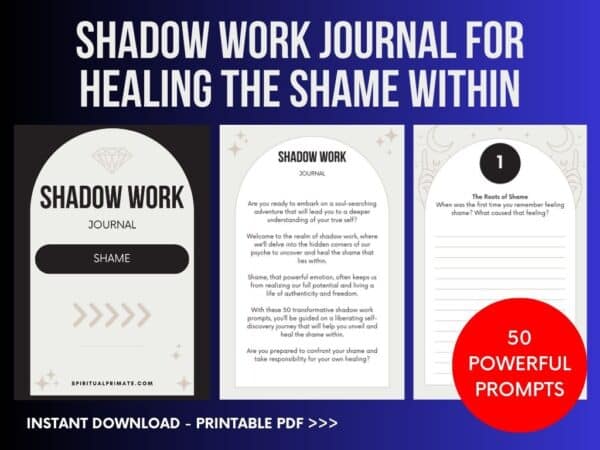Are you ready to embark on a soul-searching adventure that will lead you to a deeper understanding of your true self? Welcome to the realm of shadow work, where we’ll delve into the hidden corners of our psyche to uncover and heal the shame that lies within.
Shame, that powerful emotion, often keeps us from realizing our full potential and living a life of authenticity and freedom. With these 50 transformative shadow work prompts, you’ll be guided on a liberating self-discovery journey that will help you unveil and heal the shame within.
Are you prepared to confront your shame and take responsibility for your own healing?

Shame: A Powerful and Complex Emotion
Shame is a powerful and complex emotion that everyone experiences at some point in their lives. It is a feeling of embarrassment or discomfort caused by the awareness that we have done something wrong, failed to meet societal expectations, or acted in a way that we believe others will judge negatively. Shame often arises when we compare ourselves to others or when our actions do not align with our personal values and beliefs.
At its core, shame is a self-conscious emotion that makes us feel unworthy, inferior, or flawed. It can be triggered by various situations, such as making a mistake, receiving criticism, or being exposed to a secret or personal vulnerability. When we feel shame, we may want to hide or withdraw from others, fearing rejection or disapproval.
However, it’s important to remember that experiencing shame is a natural part of being human. It can serve as a signal that we need to reflect on our actions, learn from our mistakes, and grow as individuals. By acknowledging, understanding, and working through our feelings of shame, we can develop self-compassion and resilience, ultimately leading to a healthier self-image and stronger relationships with others.

Healing Shame through Shadow Work: A Path to Self-Compassion and Growth
Shame is a powerful and complex emotion that can affect our well-being and self-esteem. It often hides in the dark corners of our psyche, making it difficult to confront and heal. Shadow work, a psychological practice introduced by the Swiss psychiatrist Carl Jung, offers a potential solution to this issue. By exploring our shadow selves, we can bring hidden aspects of our personality to light, addressing and transforming shame into self-compassion and growth.
Understanding Shame and the Shadow
Shame is an emotion that arises when we feel that we have done something wrong or failed to meet the expectations of others, or even our own. It makes us feel unworthy, flawed, and vulnerable. While experiencing shame is a natural part of being human, it can also be detrimental to our mental health and self-esteem if not addressed properly.
The shadow, as defined by Carl Jung, represents the unconscious aspects of our personality. These are the parts of ourselves that we often suppress, deny, or disown because they are not aligned with our conscious self-image. The shadow can contain both positive and negative traits, including shame. Shadow work is the process of exploring and integrating these hidden aspects, allowing us to achieve a more balanced and authentic sense of self.
How Shadow Work Can Help Heal Shame
1. Acknowledgement and Acceptance
The first step in healing shame through shadow work is acknowledging its existence within us. We need to recognize and accept that we all have aspects of ourselves that we are not proud of. By doing this, we create a safe space for self-discovery and healing.
2. Self-Compassion
As we delve into our shadow selves and confront our shame, it is essential to approach this journey with self-compassion. By treating ourselves with kindness and understanding, we can begin to see that shame does not define who we are. Instead, it is an opportunity for growth and self-improvement.
3. Integration and Transformation
Once we have acknowledged and embraced our shame, we can begin the process of integration. This means taking ownership of our entire selves, including the aspects that we feel ashamed of. As we integrate these parts, we start to transform our shame into self-acceptance and self-compassion. This transformation allows us to let go of the crippling effects of shame and empowers us to live more authentic, fulfilling lives.
4. Growth and Resilience
Shadow work not only helps us heal from shame but also fosters growth and resilience. As we embrace our vulnerabilities and overcome our shame, we become more emotionally resilient and open to personal development. This newfound strength enables us to better handle challenging situations and emotions in the future.
Shame is a complex, self-conscious emotion that can have a significant impact on our mental health and self-esteem. Through shadow work, we can explore and integrate the hidden aspects of our personality, including shame, allowing us to transform it into self-compassion and growth. By acknowledging, accepting, and integrating our shame, we can foster emotional resilience and personal development, ultimately leading to a more balanced and authentic sense of self.

Shadow Work Prompts for Shame
1. The Roots of Shame: When was the first time you remember feeling shame? What caused that feeling?
2. Shameful Labels: What negative labels have you or others placed upon yourself? How do these labels make you feel?
3. Shame Triggers: What situations or experiences tend to trigger feelings of shame for you? How do you respond in those moments?
4. Shameful Secrets: What secrets do you keep because of shame? How does keeping these secrets affect you?
5. Healing Shameful Wounds: How can you begin to heal the wounds that shame has caused in your life?
6. Shame in Relationships: In what ways has shame impacted your relationships? How can you work to improve those relationships?
7. Shame and Vulnerability: Why is it difficult to be vulnerable about your feelings of shame? How can you open up to others about your shame?
8. Shame and Forgiveness: How can you practice forgiveness towards yourself and others for the shame you’ve experienced?
9. Shameful Comparisons: In what ways do you compare yourself to others, leading to feelings of shame? How can you break free from these comparisons?
10. The Shame of Perfectionism: How has striving for perfection caused you to feel shame? How can you embrace imperfection instead?
11. Shameful Thoughts: What thoughts do you have that contribute to your feelings of shame? How can you challenge those thoughts?
12. Shame and Self-Worth: How has shame affected your sense of self-worth? How can you work to improve your self-worth?
13. Shameful Memories: What memories bring up feelings of shame for you? How can you reframe those memories?
14. Shame and Resilience: How can you build resilience against shame?
15. Shame and Empathy: How can practicing empathy for yourself and others help reduce feelings of shame?
16. Shameful Expectations: What expectations do you or others have that lead to feelings of shame? How can you let go of these expectations?
17. Shame and Boundaries: How can setting healthy boundaries protect you from shame?
18. Shame and Acceptance: How can you practice acceptance of yourself and your feelings of shame?
19. Shameful Behaviors: What behaviors do you engage in as a result of your shame? How can you change these behaviors?
20. The Weight of Shame: In what ways does shame weigh you down? How can you lighten this burden?
21. Shame and Inner Critics: How does your inner critic contribute to feelings of shame? How can you quiet this voice?
22. Shameful Beliefs: What beliefs do you hold that contribute to your shame? How can you challenge these beliefs?
23. Shame and Self-Compassion: How can practicing self-compassion help you cope with shame?
24. Shameful Emotions: What emotions do you experience alongside shame? How can you address these emotions?
25. The Shame of Failure: How has the fear of failure caused you to feel shame? How can you reframe failure as a learning opportunity?
26. Shame and Gratitude: How can practicing gratitude help you shift your focus away from shame?
27. Shame and Mindfulness: How can mindfulness practices help you manage feelings of shame?
28. Shameful Patterns: What patterns of shame do you notice in your life? How can you disrupt these patterns?
29. Shame and Authenticity: How does feeling shame prevent you from being your authentic self? How can you embrace your true self, despite your shame?
30. Shame and Growth: In what ways has shame held you back from personal growth? How can you use shame as a catalyst for change?
31. Shame and Courage: How can facing your shame help you build courage?
32. Shameful Attachments: What attachments do you have that contribute to your shame? How can you release these attachments?
33. Shame and Healing: What steps can you take to heal from your feelings of shame?
34. Shameful Judgments: How do you judge yourself or others based on shame? How can you let go of these judgments?
35. The Shame of Unmet Needs: What unmet needs contribute to your feelings of shame? How can you work to meet these needs?
36. Shame and Responsibility: How can you take responsibility for your feelings of shame, without blame or judgment?
37. Shameful Rejections: How has rejection contributed to your feelings of shame? How can you reframe these rejections?
38. Shame and Connection: How can connecting with others help you process your feelings of shame?
39. Shame and Strengths: How can focusing on your strengths help you combat feelings of shame?
40. Shameful Lessons: What lessons can you learn from your feelings of shame?
41. The Shame of Unfulfilled Dreams: How has shame held you back from pursuing your dreams? How can you move forward despite your shame?
42. Shameful Accomplishments: What accomplishments do you feel shame about? How can you celebrate these accomplishments instead?
43. Shame and Freedom: How can you find freedom from your feelings of shame?
44. The Shame of Silence: How has silence contributed to your feelings of shame? How can you break the silence and speak your truth?
45. Shameful Habits: What habits do you have that contribute to your shame? How can you change these habits?
46. Shame and Support: How can seeking support from others help you heal from your shame?
47. Shameful Regrets: What regrets do you have that are tied to feelings of shame? How can you make peace with these regrets?
48. Shame and Transformation: How can you transform your feelings of shame into something positive?
49. The Shame of Invisibility: How has feeling invisible contributed to your shame? How can you make yourself seen and heard?
50. Shameful Reflections: What insights have you gained about yourself and your shame through these prompts? How can you use these insights to create lasting change?
Congratulations on completing this powerful journey of self-discovery and transformation! You’ve delved deep into the shadows of your shame, faced your fears and insecurities, and emerged stronger, more self-aware, and liberated.
Remember, the process of growth and healing is ongoing, so continue to reflect and revisit these transformative shadow work prompts whenever you feel the need.
As you forge ahead on your path of self-discovery, don’t forget to share your insights and experiences with others who may be struggling with their own shame. After all, we’re all in this together.
Are you ready to take the next step and embrace the beauty of your authentic self, free from the constraints of shame?
Dive Deeper Into Your Shadow Work Journey
- Product on sale
 Printable Shadow Work Journal for Healing the Shame Within [PDF]Original price was: $11.98.$5.99Current price is: $5.99.
Printable Shadow Work Journal for Healing the Shame Within [PDF]Original price was: $11.98.$5.99Current price is: $5.99. - Product on sale
 50 Shadow Work Prompts for Shame | Printable PDFOriginal price was: $5.98.$2.99Current price is: $2.99.
50 Shadow Work Prompts for Shame | Printable PDFOriginal price was: $5.98.$2.99Current price is: $2.99.

